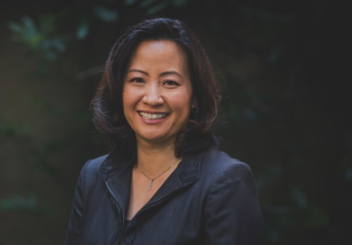By Joshua Holland
NORTHWEST ASIAN WEEKLY

Deborah Kang Gentzen
Careers can be long winding paths that from a distance seem like a series of randomly connected pathways. But as Deborah Kang Gentzen, Seattle Cancer Care Alliance (SCCA)’s Chief Strategy Officer, can tell you, it’s anything but random.
For Gentzen, who’s a distinguished panelist speaking about the subject at the 2019 Seattle Women in Leadership Symposium on March 21, it’s an issue she’s deeply invested in. As an active mentor who regularly engages with women at various stages of their careers via the Stanford Business school alumni association and locally in the Seattle area, she has developed a broad view into how careers take shape. For women in particular, she’s observed that historical norms have started to break up and reconfigure into new options over the last few years.
“Some of our organization’s younger colleagues are teaching us to redefine what we’re looking for in a career and what to settle for in terms of what the job has to offer, what the organization has to offer, and what the lifestyle around it has to offer,” said Gentzen. “And, you know, I see a lot of folks just not willing to compromise on important personal issues and values.”
As a leader, this has led Gentzen to ask, is the C Suite still the brass ring that most employees reach for?
Increasingly she’s discovered through leading numerous teams, a more individual approach based on an employee’s personal values, purpose, and broader life goals that are vital to supporting employees whose north star might not be the corner office. Gentzen has committed herself to helping create a work environment for her team that allows them to pursue various paths, whether it’s being a manager of a team they love, being a strong individual contributor, or taking time to care for their family at home as needed. Whatever the path, Gentzen thinks it’s important to help people feel good about their choices and support their career growth and potential pivots between different directions. It is especially important for some women who may choose to leave rapid trajectory careers and stay home to be the primary caregiver for their family, but then desire to re-enter the workforce at a later date.
Having made her own strategic choices throughout her career, Gentzen can personally relate to the deliberate choices that must be made when growing a career.
“My husband and I moved to Seattle 20 years ago, so we could both navigate our careers and start a family,” said Gentzen. “It turned out to be the career side had a little bit more weight on my side, leading my husband to pick up a lot more of the work at home. But that could have been different; who knows, a butterfly in the forest could have flapped its wings somewhere and it could have gone the other way. And I think going in it with that openness has served us well.”
Since arriving in Seattle decades ago, Gentzen has focused her career on healthcare working for institutions, including Premera Blue Cross and Providence Health and Services, before being recruited to help lead what became SCCA’s Proton Therapy Center — a specialized form of radiation therapy. Today as the Chief Strategy Officer for SCCA, she acts as a utility player for the organization, supporting strategy development and execution, business development, and working with the community to understand what their needs are as it relates to serving the cancer patient population.
“I like SCCA, because it’s still close to patient care,” said Gentzen. “You see patients every day and have a chance to empathize with what they’re going through. That connection means a lot to me.
And then I think the added piece about being part of a larger alliance conducting research, like searching for new discoveries for how to treat lymphoma, or how to bring online a innovative or revolutionary way to do radiation treatment, or how to understand the nutrition needs of patients, that will make a difference in their outcomes in support of the greater good is another layer to all of it.”
Using her engineering background from the Colorado School of Mines and business knowledge from the Stanford Graduate School of Business, Gentzen helps the SCCA navigate an evolving industry in the midst of embracing a system view which considers all the moving pieces and parts of healthcare as they work together and how to make it better for everyone.
“My educational background and process orientation are where I can contribute to improving the healthcare system,” said Gentzen. “I can’t contribute to helping your direct pain go away, but I can contribute to try to make the collective pain of the system get reduced. We’re seeing consolidation of healthcare, making the team to team view more important. The need to minimize the friction of all the handoffs that happen within the healthcare system is something we’re working on.”
At the event, Gentzen will share the stage with other female leaders to address topics regarding leadership, professional development, and career advancement. She plans to share what she’s learned from her decades of experience, including how she’s grown throughout her career to be a strong self-advocate and more vocal about what she needs to succeed.
Joshua can be reached at info@nwasianweekly.com.



